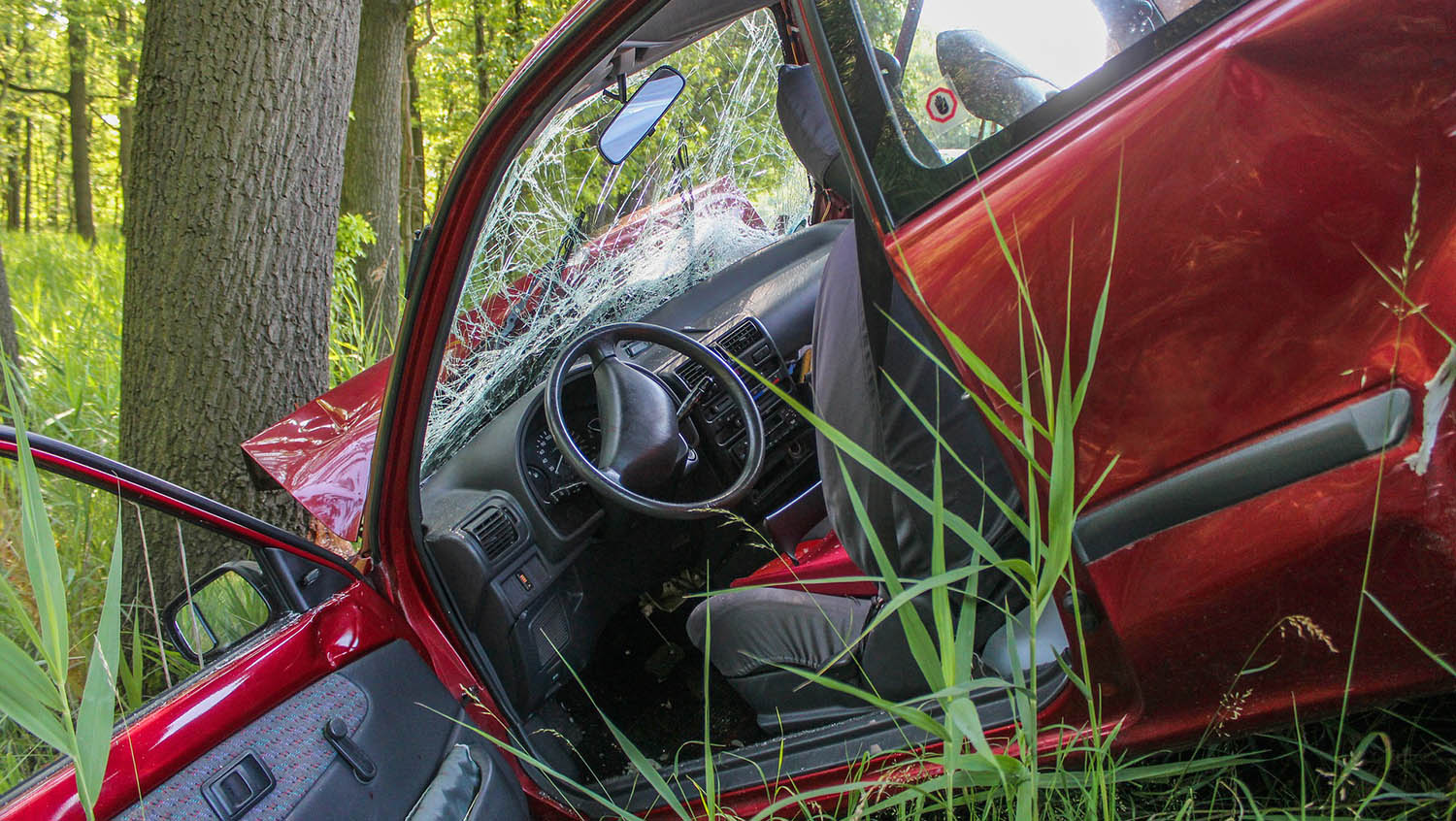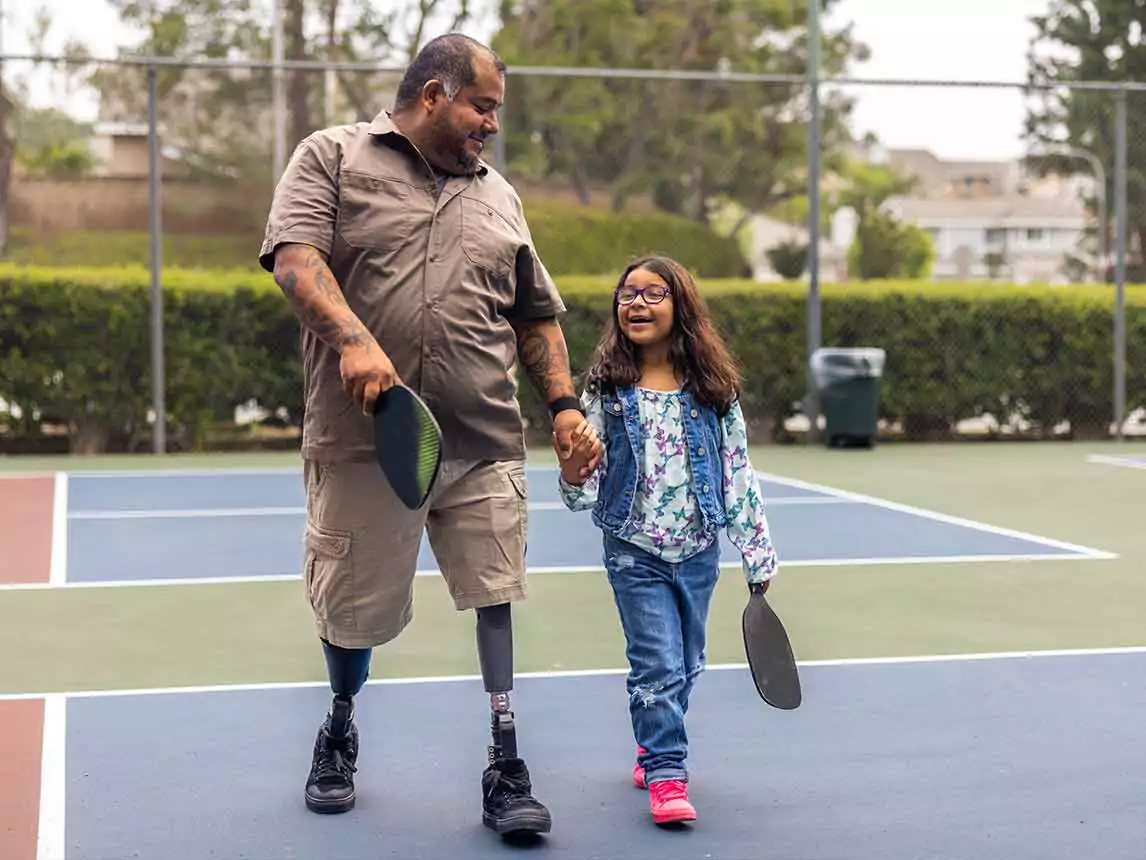Being involved in a commercial truck accident can be frightening, not to mention the fact that it can lead to substantial life-altering injuries. As an accident victim, you may feel stunned and unsure of what to do next.
If you’re fortunate enough to be able to walk away from the accident, make sure to follow a few key steps so you are well positioned if you need to pursue any kind of claim for compensation after the crash. Accidents involving a commercial vehicle are unique, and the legal proceedings that follow them may differ greatly from those following a typical motor vehicle accident.
8 Important Steps to Take After a Truck Accident
While the aftermath of a commercial truck accident is a scary time, if you can keep calm and follow a few basic steps, that can help you in the long run. The list below is a helpful guide for what to do after a truck accident:
1. Call for help from the scene
2. Take photos and notes
3. Get medical attention
4. Exchange contact information
5. Document all medical expenses
6. Get proof of injuries
7. Have your vehicle assessed
8. Hire an attorney
If you’ve been involved in a commercial truck collision, you’re likely to feel scared and, quite possibly, a little lost. These are frightening accidents that often bring with them long-lasting, severe injuries and health effects, so the more you can stick with the steps we’ve outlined here, the more likely you are to be successful with any claim for compensation or disability benefits associated with your crash. We’ve outlined below everything you need to know to protect yourself if you’re involved in an accident with a commercial truck.
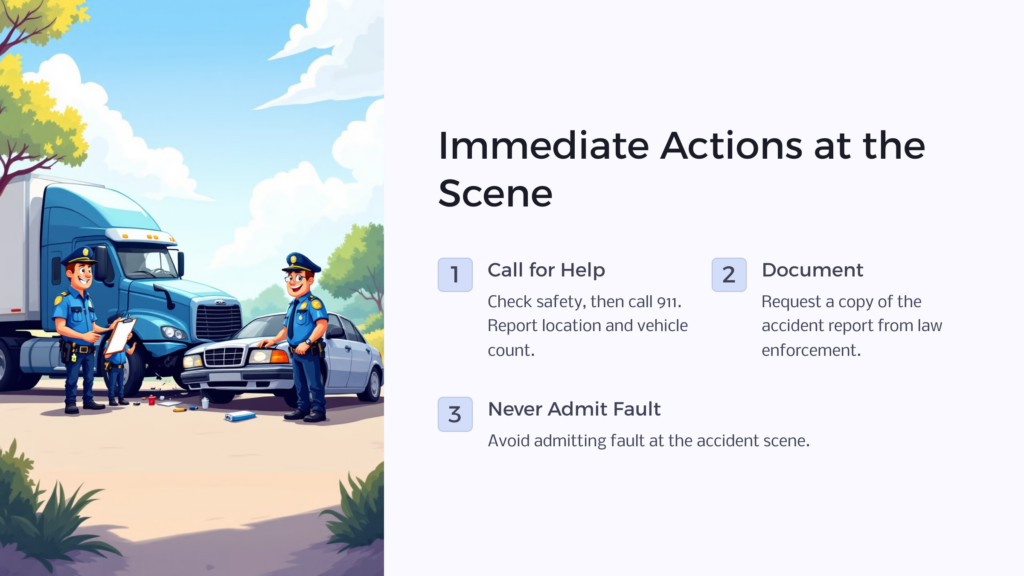
1. Call for Help from the Scene
Don’t waste any time. First, check on your own safety and the welfare of your passengers. Once you’ve assessed everyone’s condition and determined that you’re all safe, try to remove your car from the road if possible. If you can, try to confirm that the drivers and passengers in other vehicles are also okay.
You should quickly call 911 and put on your hazard lights to alert other drivers and help prevent additional accidents. No one should leave the scene until they’ve been cleared by law enforcement. Try to give the 911 dispatcher as much information as you can about your location and how many vehicles and people were involved in the accident. Never admit fault at the scene of an accident.
Once law enforcement arrives, a representative will compile an accident report and will advise you as to appropriate next steps. You should make sure to request a copy of that report in case you need it as evidence in any subsequent court proceedings. It’s very important to make sure you get this report filed – it’s one of the best ways to officially document what happened while it’s still fresh on everyone’s mind. In many states, you are required to file an accident report after any motor vehicle crash.
2. Take Photos and Notes
If you’re uninjured and it’s safe for you to walk around the crash scene, taking photos and jotting down notes is a smart step. While you may feel shaken and even disoriented, it’s important to try to capture as many details about the accident as soon as possible.
Try to snap photos with your phone of both the damage to your vehicle and any damage the commercial truck may have incurred. Make sure to get a photo of the truck’s tag number and the trucking company for which the driver works. If you’re able to take photos to document your injuries, all the better. In general, any photos you take can be used to help reconstruct how the accident happened. You might also make note of weather conditions and any other key facts you can remember about how the accident occurred and what might have influenced it.
If there are any witnesses to the accident, get their contact information. If they are willing to write down what they saw, it’s best to do it while all the details are fresh in their minds. Contact information is key in case they’re called on to give testimony on your behalf. It bears repeating that you should only take this step if it’s safe to do so – if you’re injured, or if you’re on a busy highway and law enforcement hasn’t arrived yet, hold off on walking around the accident scene.
3. Get Medical Attention
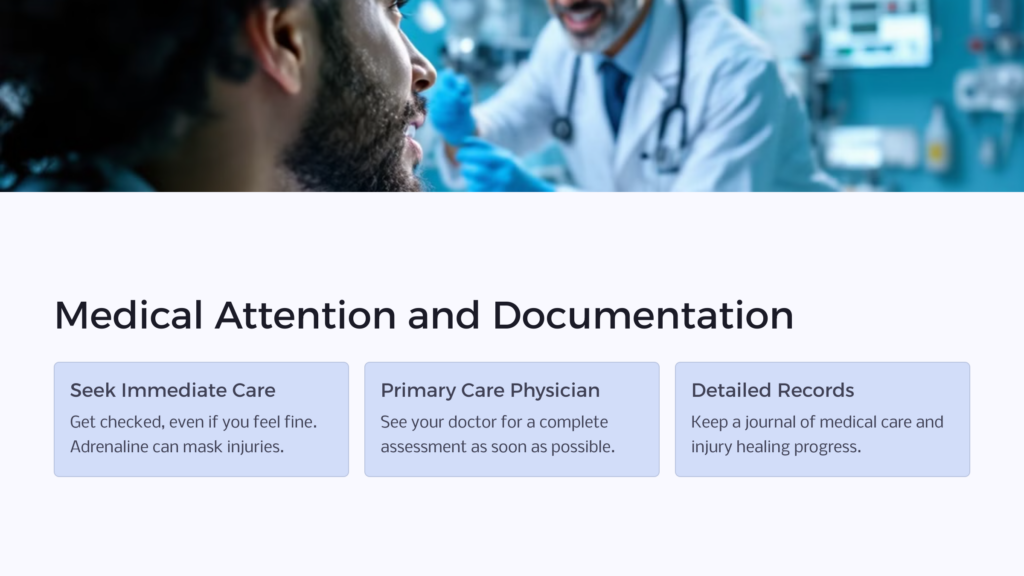
Your health and safety are of the utmost importance. If you’ve been injured in a truck crash, it’s important to get medical attention as quickly as possible. In fact, it’s a good idea to get checked out even if you don’t believe you’re injured. The rush of adrenaline after a traumatic accident could keep you from feeling pain that otherwise would alert you to a personal injury, and it’s important to quickly establish the scope and scale of any injuries. You also may have internal damage and/or bleeding, which you wouldn’t necessarily know, but a medical professional would be able to diagnose.
If you’ve called 911, chances are that EMTs or other medical professionals will arrive at the accident scene to assess the condition of everyone involved. Be sure to see your primary care physician as soon as possible for a complete assessment. If you fail to pursue medical care in a timely manner, that could impede your ability to seek compensation for any severe injuries later in the process as part of an injury claim. The same goes for anyone with you in your vehicle.
4. Exchange Contact Information
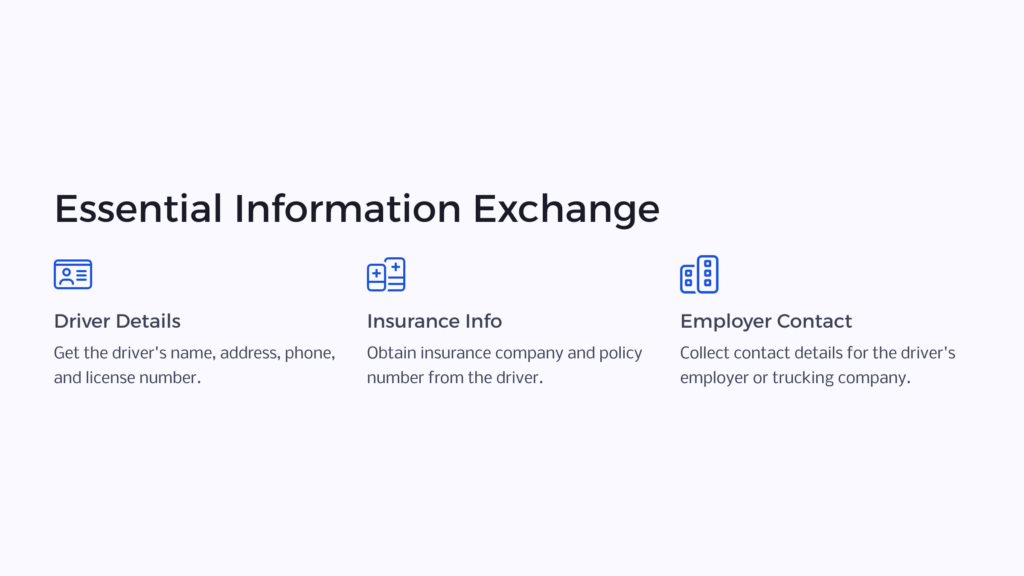
Make sure before you leave the crash scene that everyone has everyone else’s contact information – you are likely to need it in the future. Make sure you get the commercial truck driver’s name, address, and phone number, along with the insurance company and policy number. You’ll also need to get the driver’s license number and all the appropriate contact information for the driver’s employer. If there are any witnesses to the accident who stopped, also make sure to get their contact information in case you, your insurance company, or your lawyer need to follow up with them on any details.
5. Get Proof of Injuries
The first and easiest step, if you’re able, is to take photos of any injuries you suffered during the accident. You can also make sure to keep up with all medical evidence and documentation associated with any treatment you received. Keeping a journal of medical care, along with how your injury heals, is a helpful way to make sure you have comprehensive documentation of your medical care and recommended treatment.
6. Have Your Vehicle Assessed
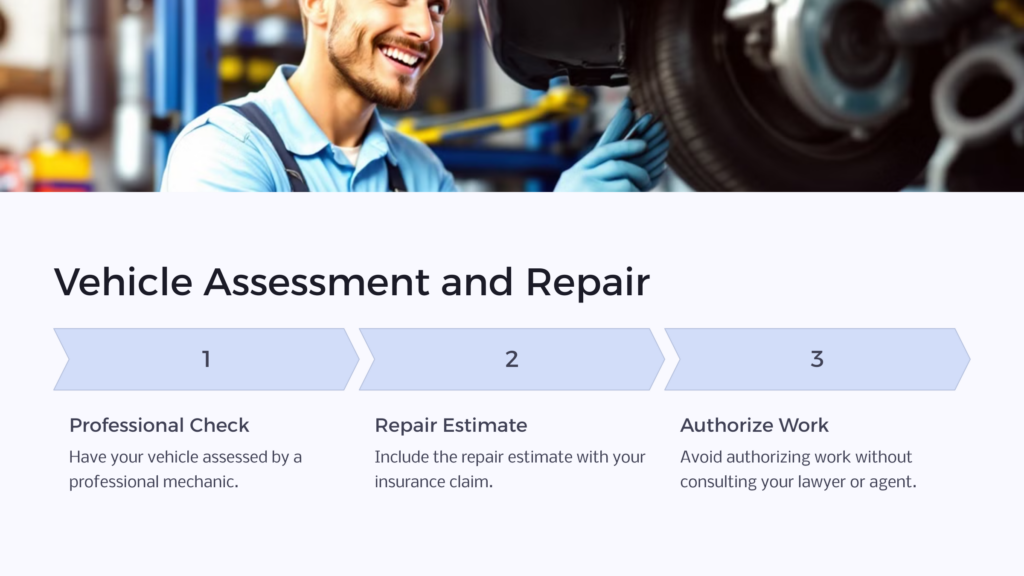
Even if you think there’s no major damage to your vehicle, you should have it checked out by a professional to rule out any damage that’s invisible to the naked eye. Any repair estimate that results from this assessment will need to be included with your insurance claim as well. Avoid authorizing any work on your vehicle without checking with your lawyer or insurance agent. Before you visit your mechanic, check with your insurance agent about everything she’ll require as part of your repair estimate.
7. Document All Medical Expenses
Make sure to keep detailed and organized records of all medical expenses you may incur as a result of your 18 wheeler accident. These will be essential to determining exactly how much your involvement in the accident has cost you out of pocket, which will be used to calculate any appropriate settlement.
8. Hire an Attorney
The aftermath of a trucking accident is complex and the process of making sure all your health care needs are covered can be lengthy and frustrating. Unlike a simple collision between two drivers, an accident involving a commercial truck typically includes several different parties, including the driver, the employer or truck company, and the shipper or manufacturer. Also, several federal trucking laws regulate the trucking industry and they must be appropriately factored into the process.
You may consider hiring an experienced attorney to help you navigate this complicated ordeal. If you’re dealing with severe injuries or a damaged vehicle, a trusted truck accident attorney may be able to guide you through any appropriate steps to take so you’re compensated fairly for expenses associated with your injuries or damages. It’s far more complicated than what you would experience with a typical car accident injury, and a law firm can help.
Even if you believe you were partly at fault for the accident, there may be other factors involved that could potentially reduce your liability. It’s your attorney’s job to find those factors and bring them to light as appropriate. You are under no obligation to talk to any insurance company – either your own or that of the commercial truck driver. It’s entirely appropriate to respond to any inquiries with the fact that you’re working with a lawyer and he’ll be in touch as soon as possible.
Collecting Evidence After a Trucking Accident
Any accident involves analyzing a great deal of physical evidence before, during, and after the crash. Initial police investigators will do their job at the scene, but interpreting specific damage to the vehicles and injuries to the passengers will likely require specialists, just as it may with other data that is recovered. Things are not always as they seem.
One way to avoid inaccuracy in truck accident evidence is through a spoliation letter, which is something your truck accident attorney will compose and send to the trucking company. It is designed to keep the company from destroying any evidence, especially since some records only have to be legally retained for six months.
A spoliation letter lets the company know that legal action is being taken. It also issues a demand that all evidence (which is usually listed in the letter) be preserved. If there are documents related to the accident, such as a police report, maintenance records, or driver’s condition, those may be attached to the letter.
This is a very important step to make certain the documents are kept available. In fact, if it is determined that records were destroyed after notice was given, a jury could be told to assume that those documents were detrimental to the companies involved.
At the Scene
If you are in an accident, there is a limit to what you can do at the scene if you are injured or getting help for your passengers. It would be ideal to call your attorney and have them send investigators on your behalf to start looking for evidence of how the accident occurred and who caused it. If you do not have an attorney to call, and you have the presence of mind to look around yourself, it would be greatly helpful.
If the police are taking pictures, don’t rely just on them. Their photos may be helpful, but they are not being taken to put your case in the best light. If you can, take your own photos. Many people have cameras on their cell phones, so use them. If you have video recording capability, use that also. Take pictures of the truck driver and all victims. Note what condition they appear to be in.
Look for skid marks. Show the beginning and end with landmarks in the photos, and which vehicle made them. Take pictures of any injuries, such as lacerations, abrasions, or broken bones—all from the scene. Look for debris, and use a scale of some sort. For a close-up photo of an item, you can use something of a standard size to show the relative size of the object you are photographing. One example would be a dollar bill or a coin. You want to use an object that everyone is familiar with and could easily replicate. If you use this technique, take one photograph with the dollar bill and one without it, which prevents someone from saying that you used the dollar bill to hide something important.
Look for witnesses. Did anyone run over to help you? Anyone standing around that saw the whole thing? Obtain their contact information and cooperation. Establish a rapport with them, thank them, and explain how important it is for them to be available later on if necessary. Explain that you need their help.
Knowing what to look for and who to ask is why experts are needed to collect all the available evidence to make certain your case is as strong as possible. Chances are you and your passengers were in shock or too injured to collect evidence.
Types of Evidence Needed After the Truck Accident
Here are some types of evidence that need to be recovered from a typical truck accident. Some will be acquired at the scene. Others will need to be demanded from the trucking company or government agencies that regulate the industry. Your attorney will gather this information for you, so you can concentrate on taking care of yourself and your loved ones.
- Photographs taken at the accident scene
- The police accident report
- Written statements from everyone involved
- Written statements from all witnesses
- Written statements from persons involved in the maintenance of the truck
- Written statements from persons who may have knowledge about the truck driver’s actions before the accident
- Hospital and doctor records
- Prior medical records of the truck driver to find out if there may have been underlying medical problems that contributed to the accident.
- Locating results of breath or blood tests taken immediately after the accident to see if the driver may have been under the influence of alcohol, illegal drugs, or even prescription medication, which may have caused drowsiness or a loss of physical abilities.
- Accident reconstruction specialists.
- Recovery of data from onboard devices, such as an Event Data Recorder, an Electronic On-Board Data Recorder, an Eaton VORAD crash avoidance system, a GPS, or even mobile phones. (All these devices can assist in locking down times, locations, braking times, vehicle speed, hours of service, time of cell phone calls, or texting.)
- The truck driver’s logbook (delays because of traffic, mechanical breakdowns, or loading and unloading might put time pressure on the driver to speed to make up for the time lost).
- The truck driver’s driving history and training records.
- The truck driver’s personnel file.
- The driver’s cell phone records. Was he texting, using email, or GPS while driving?
- Contracts between the company and the trucker.
- Proof of insurance.
- Shipping records.
- Locating the Drug and Alcohol policy of the trucking company as required by the FMCSA.
- Establishing that the Drug and Alcohol policy was provided to the driver through a receipt signed by the driver.
- Records of the FMCSA involving the trucker and the trucking company.
- All correspondence between the trucking company and the FMCSA.
- Locating and preserving surveillance video that may show important information before or during the crash.
- In addition, if any vehicle in the accident was disabled and towed from the scene and the truck driver was cited, a breath or blood test would be required. If a citation was not issued, there would be no requirement for a blood or breath test.
Other Investigative Avenues After the Truck Accident
Interviews must be taken as soon as possible to guard against th
possibility of memories fading or changing over time. It is also possible that a trucking company might try to influence the testimony of witnesses to reduce their potential for liability.
As the case progresses, it may be determined that sworn depositions need to be taken with a stenographer. It may be decided that these should be videotaped. No matter how it is done, the testimony of the witnesses is given under oath and recorded. If the interview is videotaped, experts will then be able to review it and assess the credibility of a witness. For example, a weak witness might be overwhelmed by all the people present and give conflicting testimony from an earlier interview. They may be easily intimidated by the opposing attorney, or feel uncomfortable speaking in a public courtroom. If they get flustered, they just may not be believable.
Manufacturing defects in the truck, missing or damaged road signs, roads that were not repaired, an improperly secured load, driving too long without a break, driving while drinking, debris in the road from another vehicle, the improper action of a driver of another vehicle, a mechanical defect, and improper or missing maintenance can all cause accidents.
The truckers themselves are certainly known to bend and break these rules, but they are not the only ones. The trucking company or the shipping companies may impose unreasonable delivery requirements, so the driver has little choice but to violate the rules in an effort to meet deadlines.
If the trucking company kept a driver employed when they knew that person had, for instance, a history of alcohol or drug abuse, the company may be more clearly liable.
If the truck is loaded with hazardous materials or chemicals, it must have proper signage displayed, and the driver must be properly notified. If either is lacking, liability may attach to the trucking company, the shipping company, the shipper, or the driver. This area can be very complicated and may require experts to sort out everything.
A thorough investigation may turn up a pattern of abuse by either the trucking company or the driver. With evidence showing a systematic and repeating problem, they may be more inclined to make a fair settlement so that this pattern does not become well known.
A great number of items must be completed as rapidly as possible, which is why truck accident personal injury attorneys may have an entire staff of assistants and specialized investigators to handle these chores.
All these rules make for a complicated system, but they are designed to protect the motoring public. If these rules are violated, many people will be in danger. It may take a skilled team of professionals to ferret out the violations.
Liability
Any number of primary causes of an accident may be due to negligence on the part of the driver, the trucking company, their employees, or even a loading company. These include speeding, inattention, texting, equipment failure, falling asleep while driving, and drug or alcohol abuse, tailgating, or carrying a load that is too heavy. An expert investigation may be needed to determine all the causes and responsibilities.
Other parties that could be liable are the leasing company of the truck, the leasing company of the trailer, or the company that owned the equipment. Several companies could be involved. The driver could also be responsible if that person took a vehicle out on the road knowing that repairs were required but had not been completed. Because of these types of situations, many different people and organizations could be involved in a single chain of events that led to an accident.
If necessary, these types of entanglements must be sorted out by personnel experienced in establishing these connections. It is a difficult process and requires people who specialize in compiling this type of information.
Disability Benefits After a Truck Accident
As the victim of a truck crash, if you suffer serious injuries that render you unable to perform your day-to-day work duties, you may be eligible for Social Security disability benefits. But it’s not guaranteed. You must apply and go through the whole approval process before being awarded any benefits.
Approval depends on the exact nature of your personal injury and how your current condition affects your ability to perform your day-to-day work tasks. If the Social Security Administration concludes that your injuries are severe enough to prevent you from doing any kind of work, you may be approved for Social Security Disability Insurance (SSDI) benefits or Supplemental Security Income (SSI).
This is another facet of your situation that could call for a qualified lawyer – working with a disability attorney can help make the process of submitting your initial claim and potentially navigating the appeals process much simpler and less stressful. Most social security disability claims are rejected at their initial submission, and many can remain tied up in the appeals process for months or years. But a knowledgeable disability attorney can help evaluate the strength of your claim and advise you on appropriate medical documentation, greatly increasing your chances of having your Social Security disability claim approved much earlier in the process.
Being involved in an accident with a commercial truck can leave you shaken and not knowing quite what to do. But you don’t have to handle everything by yourself. With the help of the important steps outlined above and the counsel of a qualified attorney, you can make it successfully through the aftermath of an 18 wheeler accident—while protecting yourself, your rights, and your overall health and well-being.
 Benefits.com Advisors
Benefits.com Advisors
With expertise spanning local, state, and federal benefit programs, our team is dedicated to guiding individuals towards the perfect program tailored to their unique circumstances.
Rise to the top with Peak Benefits!
Join our Peak Benefits Newsletter for the latest news, resources, and offers on all things government benefits.















